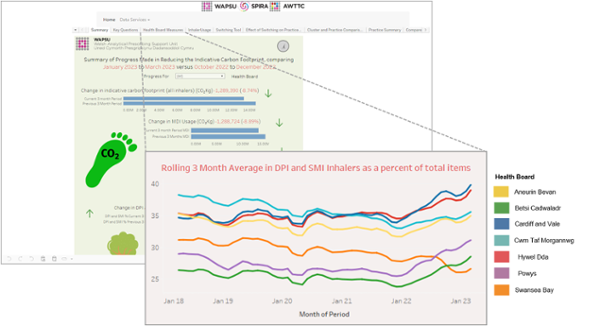How AWMSG and AWTTC are supporting sustainability for the NHS in Wales
9 October 2023
The Well‑being of Future Generations (Wales) Act (2015) is ground-breaking legislation that aims to ensure that future generations in Wales have at least the same quality of life as we do now. Public bodies in Wales, including the All Wales Medicines Strategy Group (AWMSG) and the All Wales Therapeutics and Toxicology Centre (AWTTC) have a legal duty to take into account the impact that their decisions will have on future generations. AWMSG and AWTTC have committed to a sustainability pledge. AWTTC has set up a Sustainability Group to support AWMSG to consider the act’s ‘sustainable development principle’ in its decision‑making.
A report, AWMSG and the Well-being of Future Generations (Wales) Act (2022), outlines how AWMSG and AWTTC are working to achieve the act’s seven well‑being goals through four well‑being objectives. The report emphasises the importance of communication and collaboration with stakeholders, including the pharmaceutical industry, to reach those goals.
Helping the NHS in Wales to reduce its carbon footprint
A national strategy to reduce the carbon footprint of inhalers in Wales has gone through AWMSG’s endorsement process. It outlines key actions for the NHS to follow and emphasises a commitment to collaborate with a range of stakeholders, including the pharmaceutical industry, to achieve this aim.
AWMSG prescribing guidelines support sustainability
In December 2021, AWMSG endorsed prescribing guidelines that aim to reduce variation in inhaler prescribing in Wales, for the management of adult asthma and chronic obstructive pulmonary disorder (COPD). Prescribing guidelines for managing paediatric asthma were endorsed in May 2023. These guidelines encourage consideration of the NHS Wales decarbonisation strategic delivery plan and recommend preferential prescribing of dry powder inhalers (DPIs) and soft mist inhalers (SMIs) rather than metered dose inhalers (MDIs). This aligns to the target for the NHS in Wales to reduce MDI use: from more than 70% of inhalers prescribed to less than 20% by 2025.
AWTTC decarbonisation dashboard – reporting progress in decreasing the carbon footprint of inhalers in primary care in Wales
AWMSG and AWTTC think about the long‑term impacts of what they do, one of their four well‑being objectives. A decarbonisation dashboard to show the carbon footprint from the use of inhalers issued in primary care in Wales has been developed. The dashboard has:
- data on health board, cluster and GP practice prescribing;
- data on the carbon footprint and money spent on inhalers available for prescribing within Wales; and
- a switching tool, to help prescribers help patients make the change to using a DPI.
Data show an upward trend in use of DPIs and SMIs, as a percentage of total items, from Spring 2022 across most Welsh health boards. This followed the endorsement of the updated prescribing guidelines for managing adult asthma and COPD in December 2021 (see Figure 1).
Figure 1: Rolling 3-month average in DPI and SMI inhalers as a percentage of total inhaler items used in primary care in Wales, across all Welsh health boards between April 2018 and March 2023 (showing SPIRA summary page in background)

This shows how quickly the work of AWMSG and AWTTC can influence prescribing practices in Wales, and the importance of being able to capture the impact of this decision‑making through data collection. The dashboard is currently available to all NHS staff on the Server for Prescribing Information Reporting and Analysis (SPIRA), with monthly summary reports generated that are available for the public to see on this website.